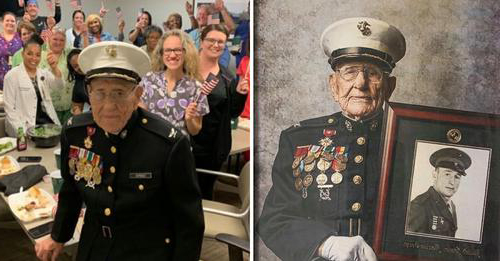
World War II stands as a pivotal moment in global history, marking a significant transformation in political, social, and military landscapes that continue to resonate today. The legacy of those who participated in this monumental conflict is profound, as they fought bravely for freedom and justice during a time of unprecedented turmoil. The sacrifices made by countless individuals during this period remind us of the high cost of liberty and the resilience of the human spirit.
As we reflect on the past, it’s essential to recognize the contributions of veterans who lived through these turbulent times. Fortunately, some of these remarkable individuals are still with us today, sharing their rich experiences and personal stories from the battlefield. Their narratives serve as living history, offering invaluable insights into the realities of war and the enduring impact it has on those who served.
With each passing year, the number of World War II veterans diminishes, a reality that underscores the importance of preserving their stories for future generations. Many of these courageous men and women are now in their 90s or older, having witnessed immense changes in the world throughout their lifetimes. Their firsthand accounts provide a unique perspective that can help younger generations understand the complexities of war and the sacrifices made by those who came before them.
One veteran who stands out in this regard is a remarkable individual from Alabama who recently reached a significant milestone: his 100th birthday. This centenarian, a veteran who served in not only World War II but also the Korean conflict and the Vietnam War, embodies the spirit of patriotism and dedication to his country.
Retired Marine Colonel Carl Cooper is a testament to the commitment and bravery of those who served in multiple conflicts. His journey began when he enlisted in the Marine Corps in 1942, a decision that would shape his life in profound ways. By the end of World War II, he had ascended to the rank of 1st Lieutenant and found himself stationed in Okinawa, a crucial battleground during the war. The Battle of Okinawa was notorious for its intensity and devastating consequences, yet Colonel Cooper emerged from this harrowing experience, demonstrating not only his courage but also his determination to serve his nation.
Throughout his military career, Colonel Cooper accumulated numerous accolades for his exceptional service. He was awarded an impressive array of medals, totaling more than twenty, including a Presidential Unit Citation with one star, a Marine Corps Medal with four stars, a United Nations Medal, and the Legion of Merit Medal. These honors reflect his unwavering commitment to duty and excellence in the face of adversity.
In reflecting on his experiences, Colonel Cooper humbly attributes his achievements to a sense of obligation to his country. He stated, “I was only doing what my country needed me to do, and I came home.” This sentiment echoes the feelings of many veterans who served selflessly, often prioritizing the needs of their country above their own.
As we observe National Veterans and Military Families Month, it is crucial to honor and remember the sacrifices of individuals like Colonel Cooper. Their stories highlight not only the bravery exhibited during times of war but also the resilience and strength of character that define the military community. The contributions of veterans extend beyond the battlefield, shaping the very fabric of society and influencing generations to come.
In recognizing the service of veterans, we also acknowledge the families who supported them through thick and thin. The sacrifices made by military families often go unnoticed, yet their strength and resilience are integral to the overall narrative of service. As veterans like Colonel Cooper celebrate their milestones, it is essential to recognize the role that family and community play in the lives of those who have served.
The journey of veterans does not end with the conclusion of active duty; many continue to serve their communities in various capacities, contributing to society in meaningful ways. They often become advocates for peace, education, and community service, embodying the values they fought to protect. Their experiences and insights can inspire future generations to engage in civic duties and foster a spirit of patriotism.
As we look to the future, it is imperative to ensure that the memories and lessons learned from the experiences of World War II veterans are preserved. This can be achieved through various means, including storytelling initiatives, educational programs, and community events that focus on honoring their contributions. By sharing their narratives, we can bridge the gap between generations and foster a deeper understanding of the sacrifices made for the freedoms we enjoy today.
In conclusion, the legacy of World War II veterans like Colonel Carl Cooper serves as a powerful reminder of the importance of courage, sacrifice, and resilience in the face of adversity. As we honor these remarkable individuals, we must also commit ourselves to preserving their stories and ensuring that their sacrifices are never forgotten. By doing so, we pay tribute not only to the veterans of the past but also to the values they embodied—values that continue to shape our world today. Let us carry their legacy forward, ensuring that the spirit of their service lives on for generations to come.